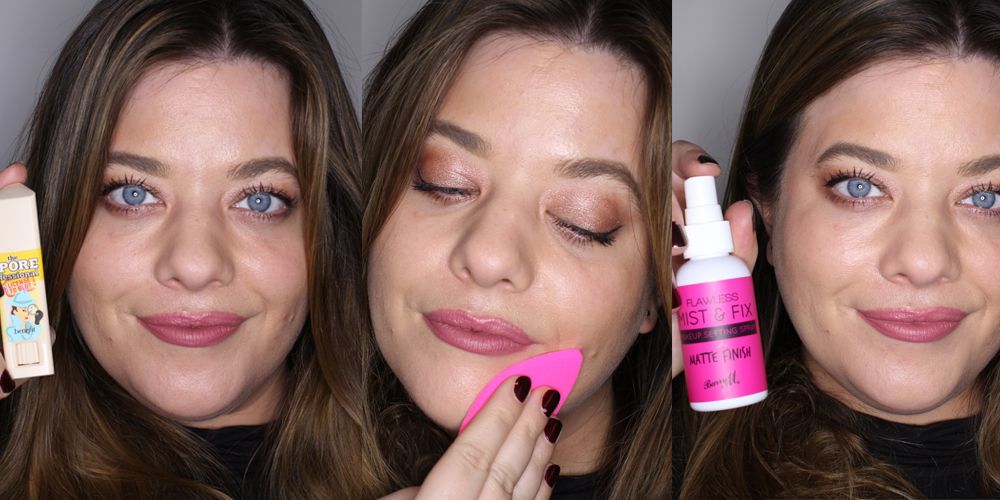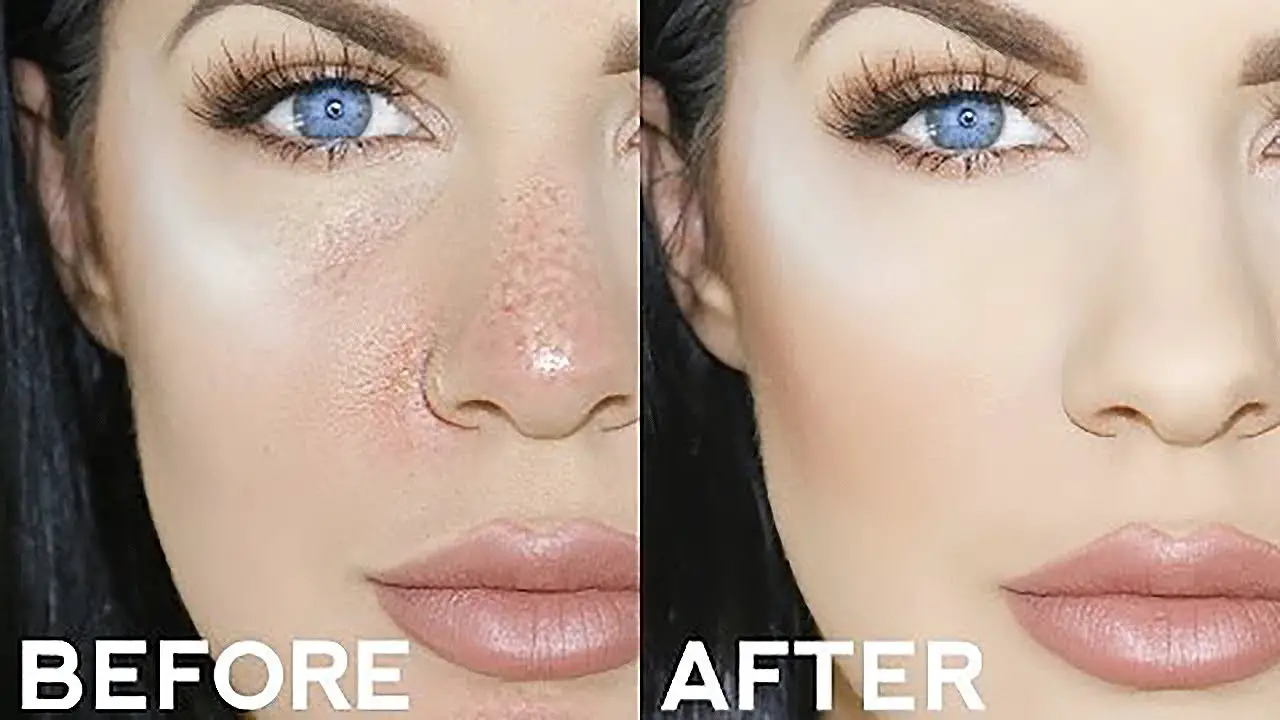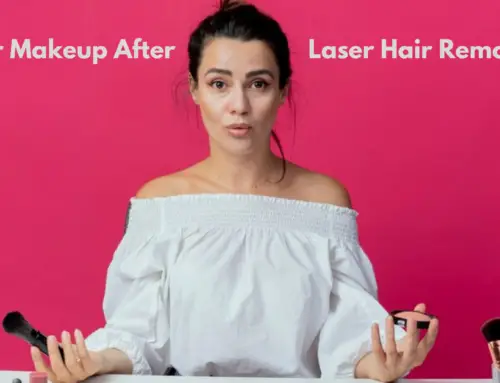Have you ever wondered why your makeup seems to vanish, even after using a setting spray? You spent time perfecting your look, only to have it fade away throughout the day. It can be frustrating and leave you questioning the effectiveness of your products. So, what exactly is going on? Let’s dive into the reasons why your makeup may come off despite using a setting spray.
When it comes to makeup longevity, setting sprays are supposed to be a game-changer. However, there are several factors that can contribute to your makeup still coming off. One reason is the quality of your setting spray. Not all setting sprays are created equal, and some may not have the power to truly lock in your makeup. Additionally, your skin type and the environment you’re in can also play a role. Oily skin tends to break down makeup more easily, while humid weather can cause your makeup to melt. Finding the right combination of products and techniques can help ensure that your makeup stays in place throughout the day.
Setting spray helps to lock in your makeup, but there are a few reasons why it may still come off. First, make sure you’re using a high-quality setting spray designed for your skin type. Additionally, the formula and application of your foundation and other makeup products can affect longevity. Finally, factors like humidity, oiliness, and touching your face can cause makeup to wear off. Consider using a long-wearing foundation and primer, and try blotting papers or a mattifying powder throughout the day.

Why Does My Makeup Come Off Even with Setting Spray?
Setting spray is a popular product in the world of makeup. Many people use it to help their makeup last longer and stay in place throughout the day. However, there are instances when makeup still comes off despite the use of setting spray. So, why does this happen? What factors contribute to makeup not staying intact even with the help of setting spray? In this article, we will explore the reasons behind this common issue and provide insights on how to tackle it.
1. Quality of Setting Spray
The quality of the setting spray you use plays a crucial role in its effectiveness. Low-quality setting sprays may not have the right ingredients or formulation to keep your makeup in place. These sprays may lack the necessary binding agents that are essential for locking in your makeup. It’s important to invest in a good-quality setting spray from reputable brands that are known for their longevity and performance.
High-quality setting sprays often contain ingredients like polymers or film formers that help create a barrier on the skin, preventing makeup from smudging or wearing off. These setting sprays also have a finer mist, which allows for better distribution and coverage on the face. Choosing a reputable brand and investing in a good-quality setting spray can make a significant difference in the longevity of your makeup.
2. Application Technique
The way you apply your makeup and setting spray can greatly impact its longevity. If you’re not applying your makeup properly or not using the setting spray correctly, it can lead to makeup coming off easily. Here are a few factors to consider:
a) Prep and Prime
Prepping and priming your skin is an essential step in ensuring makeup longevity. If you skip this step, your makeup may not adhere properly to the skin, making it prone to coming off. Cleanse and moisturize your face before applying makeup, and use a primer to create a smooth base. This helps in creating a better canvas for your makeup and improves its staying power.
b) Thin Layers
Applying makeup in thin layers allows for better adherence and prevents it from easily rubbing off. When applying foundation, use a small amount and blend it well into the skin. Layering your makeup too heavily can lead to a cakey finish and make it more prone to transferring or coming off.
c) Proper Setting Spray Application
When it comes to setting spray, the application technique plays a significant role. After completing your makeup, hold the setting spray bottle at an arm’s length and mist it evenly across your face. Avoid spraying too close or too much product, as it can create a wet or sticky residue that may cause makeup to slide off. Allow the setting spray to dry naturally and avoid touching or rubbing your face during this process.
3. Skin Type and Texture
The type and texture of your skin can also impact how setting spray works for you. Different skin types have different needs and react differently to makeup products. Here are a few factors to consider:
a) Oily Skin
If you have oily skin, you may find that your makeup tends to come off more easily. Oily skin produces excess sebum, which can break down makeup and make it slide off. In this case, using a mattifying primer before applying makeup and opting for oil-free or long-wearing products can help increase the longevity of your makeup.
b) Dry Skin
Dry skin can also affect the staying power of makeup. If your skin is dry, it may not provide enough moisture for the makeup to adhere properly. Applying a hydrating primer or moisturizer before makeup application can help create a smoother base and prevent makeup from flaking or coming off.
c) Texture of the Skin
The texture of your skin, such as roughness or unevenness, can impact how well makeup adheres to the surface. Exfoliating regularly and keeping your skin well-moisturized can help in creating a smoother canvas for makeup, increasing its longevity.
4. Environmental Factors
Environmental factors can also have an impact on the staying power of your makeup, regardless of using setting spray. Here are a few factors to consider:
a) Humidity
High humidity levels can cause makeup to melt or slide off easily. When the air is humid, moisture in the air can affect the longevity of your makeup, including setting spray. If you live in a humid climate, opting for long-wearing or waterproof makeup products can help combat the effects of humidity.
b) Heat
Heat can also impact the performance of your makeup. When exposed to high temperatures, makeup can start to break down and melt. This can happen even with the use of setting spray. Choosing lightweight and breathable makeup formulas and storing your makeup products in a cool, dry place can help prevent heat-induced makeup mishaps.
c) Rubbing or Touching the Face
Constant rubbing or touching of the face can cause makeup to come off easily. This may include habits like resting your face in your hands or rubbing your eyes. Be mindful of these actions and try to minimize touching your face throughout the day to help preserve your makeup and make it last longer.
5. Product Interactions
Sometimes, certain makeup products may not work well together and can cause makeup to come off more easily. Here are a few instances of product interactions that can affect makeup longevity:
a) Incompatible Formulations
Combining incompatible formulations, such as using a water-based foundation with an oil-based primer, can lead to makeup separation and reduced staying power. It’s important to ensure that the products you use are compatible with each other and work well together to create a cohesive base.
b) Layering Too Many Products
Layering multiple products excessively can also affect makeup longevity. When you apply too many layers of makeup, it can become heavy and prone to transferring or coming off. Opt for a minimalistic approach and use only the necessary products to achieve the desired look.
6. Touch-Ups and Maintenance
No matter how well you prepare and apply your makeup, touch-ups and maintenance are often necessary throughout the day. Here are a few tips to help maintain your makeup:
- Carry blotting papers or oil-absorbing sheets to remove excess oil from the skin without disturbing the makeup.
- Use a setting powder to mattify the skin and lock in the makeup.
- Carry a small makeup brush or sponge to fix any smudges or areas where makeup has come off.
- Avoid excessive touching or rubbing of the face.
Why Does My Makeup Come Off Even with Setting Spray?
Despite using setting spray, makeup can still come off due to various factors such as the quality of the product, application techniques, skin type, environmental factors, and product interactions. By considering these factors and making necessary adjustments, you can improve the longevity of your makeup and ensure it stays in place throughout the day.
Key Takeaways
- Setting spray may not always provide long-lasting makeup because it depends on various factors such as skin type and weather conditions.
- Applying thin layers of makeup and allowing each layer to dry before applying the next can help improve its longevity.
- Inadequate skincare routine, such as not moisturizing or using a primer, can cause makeup to come off easily.
- Touching or rubbing the face frequently can disrupt the makeup, even if setting spray is used.
- Some setting sprays may not be formulated to hold certain types of makeup, so it’s important to choose the right setting spray for your specific makeup products.
Frequently Asked Questions
Here are some commonly asked questions about why makeup may come off even with setting spray:
1. How does setting spray work?
Setting spray works by creating a thin, invisible layer on top of your makeup. It helps to lock in the products and prevent them from fading or smudging throughout the day. The spray usually contains ingredients like film-formers or polymers that adhere to the skin and hold the makeup in place.
However, the effectiveness of setting spray can depend on various factors, such as the formulation of the product, the type of makeup you’re wearing, and your skin type. It’s important to choose a high-quality setting spray and apply it correctly for best results.
2. Can using too much setting spray cause makeup to come off?
Using too much setting spray can actually have the opposite effect and cause your makeup to come off. If you apply an excessive amount of setting spray, it can create a wet or sticky film on your face, which can cause your makeup to clump or slide off.
It’s important to use the recommended amount of setting spray, usually a light mist, and evenly distribute it across your face. This will help the spray to set your makeup without weighing it down or compromising its staying power.
3. Is the problem with the setting spray or my foundation?
The issue with your makeup coming off may not necessarily be with the setting spray itself. It could be due to the interaction between the setting spray and your foundation. Some foundations may not work well with certain setting sprays, leading to makeup breakdown.
It’s important to consider the compatibility of your foundation and setting spray. If you notice that your makeup doesn’t last when using a specific setting spray, try switching to a different one or experimenting with different foundation formulations to find the best combination.
4. Are there any tips for making my makeup last longer with setting spray?
Absolutely! Here are a few tips to make your makeup last longer when using setting spray:
First, make sure to prep your skin properly before applying makeup. Cleanse, moisturize, and use a primer to create a smooth canvas for your products. This will help the makeup adhere better to your skin and increase its longevity.
Additionally, set your makeup in layers. Apply a light layer of makeup, spray with setting spray, and then continue with the rest of your routine. This helps to build up the longevity and ensures that each layer is locked in place.
5. Can weather conditions affect the effectiveness of setting spray?
Yes, weather conditions can impact how well a setting spray works. In humid environments, where there is a lot of moisture in the air, setting sprays may struggle to set and hold your makeup in place. The excess moisture can cause the spray to break down and make your makeup more prone to smudging or melting.
In drier climates, on the other hand, setting sprays may be less effective in preventing makeup from drying out or fading throughout the day. It’s essential to consider the weather conditions and choose a setting spray that is suitable for the climate you’re in.

Even with setting spray, your makeup may still come off due to various reasons. One possibility is that the setting spray you are using is not effective enough to hold your makeup in place throughout the day.
Another reason could be that you are not applying the setting spray properly. It’s important to evenly distribute the spray over your face and let it dry before touching your face or applying additional products.
In addition, factors such as oily skin, humidity, and facial movements can also contribute to makeup coming off. Oily skin can cause makeup to break down faster, while humidity can make it easier for makeup to slide off. Facial movements, such as rubbing or touching your face, can also disturb the makeup and cause it to come off.
To improve the longevity of your makeup, consider using a high-quality setting spray, applying it correctly, and using other techniques like priming your skin and using long-wearing or waterproof makeup products. Remember to avoid touching your face throughout the day to minimize the chances of your makeup rubbing off.






Leave A Comment